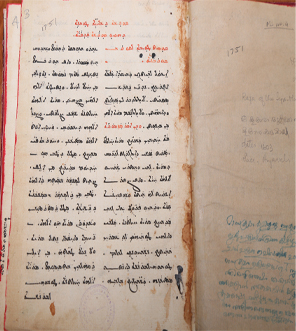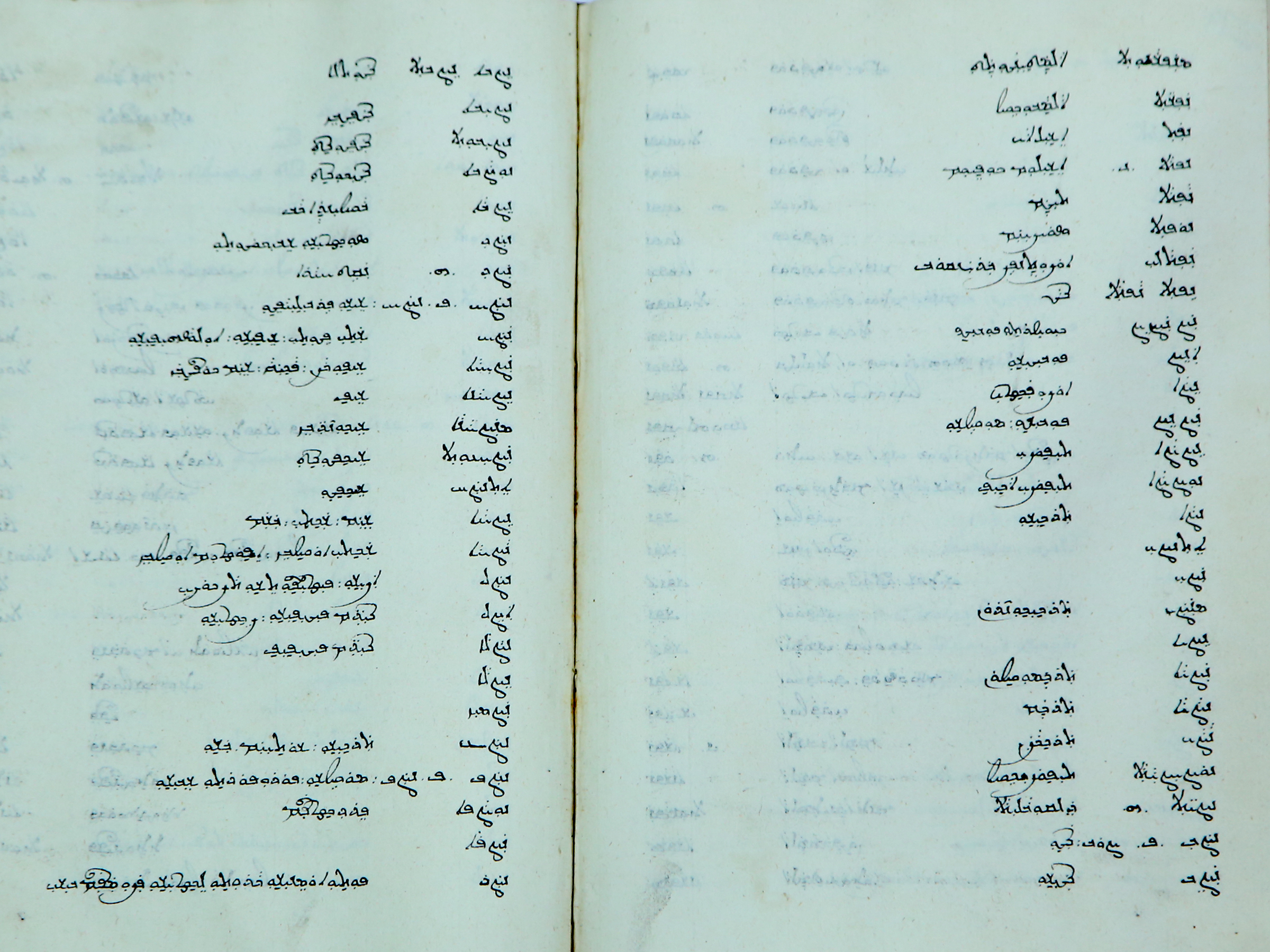Syriac manuscripts
The archival collection of the Syriac manuscripts is composed of hundred and seven manuscripts (107) of different categories. They are divided into biblical, liturgical, catechetical, grammatical, literary works and dictionaries. The liturgical manuscripts has been further classified into three categories and are related to the Liturgy of the Eucharist, the Divine Office and the other liturgical texts other than the Divine Office.
The collection of Biblical manuscripts contains seven manuscripts. It contains the books from both the Old and NewTestaments. However, it does not have a complete set either from the Old Testament or from the New Testament.
The manuscripts contain the books from Tobit to Qohelet, Judith to Maccabees, Ezra to Esther, the Epistles of James, John and Paul, the Acts of the Apostles, the Book of Revelation (????? ??? (Gelyana) with an explanation, a glossary of Syriac words from the Book of Revelation, their meaning in Karshon and, some writings on certain readings from the Gospel of St Matthew.
The collection of the Liturgical Manuscripts is composed of fifty-five manuscripts. They are categorised into three groups according to their content.
They are related to the Eucharistic Liturgy, the Divine Office and the other liturgical texts respectively.
The collection of the Eucharistic Liturgy contains seven manuscripts and three of them are of the Malabar tradition, and four of them belong to the Chaldean tradition.

(liturgical text prepared by Bishop Francis Roz S.J. in 1662)
Against the history of the Malabar Liturgy, the manuscript of the liturgical text prepared by Bishop Francis Roz S.J. is worthy of special mention among the manuscripts of the Malabar tradition. The other four manuscripts are of the Chaldean tradition. They contain three East Syrian Anaphorae. One manuscript contains the Anaphora of Addai and Mari in its ancient form, and the others contain the details with some variations.
The collection of the manuscripts of the Divine Office contains the manuscripts of the breviary that belong to the Malabar tradition. They reveal certain distinct attributes in the content, especially in the documentation of the prayers for various occasions such as feasts, fasts and ordinary days. The manuscripts are the texts of the Divine Office but they are not identical in the content as they differ in specific aspects,for example, their description of the prayers for different occasions. With regard to the content of the manuscripts, a few deserve special mention. One manuscript contains the calendar for the feasts while another one has the text of a Psalm. They contain the
prayers for the Sundays of Annunciation,the feasts of the Nativity, Epiphany, special prayers for the Night of Maundy Thursday, the Resurrection, the Pentecost, the three day fast of the Ninevites and the prayers for the Great Fast.
The manuscript copies of the Breviary that belong to the collection created by St Kuriakose Elias Chavara are worthy of special mention. He collected the manuscripts in consultation with the then Malpans and published the printed texts much before Paul Bedjan could edit and publish his Breviarium Chaldaicum.
The collection of the manuscripts of the Liturgy other than the Divine Office contains the Order of the Priests and the funeral services primarily. The collection comprises various manuscripts with a variety of subjects such as the rites of ordination, confirmation and other sacraments like baptism and marriage. Rites of the blessings for different occasions, certain liturgical readings, preparatory and thanksgiving prayers prior and subsequent to the Eucharistic celebration, the Holy Mass for the departed, the funeral services, the prayers for some feasts of Our Lord and the services for the Holy Saturday are the part of this collection of liturgical manuscripts.
In the collection of the Liturgical Manuscripts, there is one important manuscript worthy of special mention as it contains one of the Memre6 of Alexander the Indian, an unidentified Syriac writer. Along with this Memra, the manuscript contains the details about the Offices for the Sundays of Annunciation, Feasts of the Nativity, the Circumcision of the Lord, the Epiphany, the Transfiguration and the Ascension of the Lord, the Pentecost, Exaltation of the Cross, the Nativity and the Assumption of Blessed Mary and the Commemorations as well as the Feasts of various Saints such as St Stephen, Hormizd, St Micheal the Archangel, the Holy Innocents, St George, Blessed Mary Mother of God, St John the Baptist and St Lawrence the Martyr.
(Syriac book of festival prayers)
It also contains the commemorations of the Apostles, the Evangelists, the Martyrs, Confessors and Doctors along with the remembrance of Holy Women, the Dead and of a Virgin.
The Catechetical Works contains ten manuscripts. This collection comprises of Syriac texts, Syriac translations and Karshon manuscripts. One of the Karshon manuscripts Vedatharkkam is of special mention as it was written by Mar Joseph Kariyattil in the form of a dialogue, expounding the Catholic faith to a Jew, a gentile as well as to a non-Catholic.
The Literary Manuscripts is formed of literary works, grammars, dictionaries and glossaries. The Literary work itself contains ten manuscripts. The works of Abdišo, the Metropolitan of Nisibis, Epiphanius of Cyprus, Bar Hebraeus, St Ephrem, St Isaac of Nineveh, Iso Yahb the Metropolitan of Arbel, and Patriach Mar Joseph, and the poet Khamis are the part of this collection. The collection also contains several letters and sermons. The letters are of Mar Gabriel, the Metropolitan of All India, Mar Simon, the Chaldean Metropolitan and Mathew, the Archdeacon of All India.
The Grammatical Collection contains seventeen manuscripts. It is formed of Syriac, Malayalam and Karshon manuscripts. The grammar of Bar Hebraeus, Mar Abdiso and Isaac of Sardona are there among Syriac manuscripts.
The collection of Dictionaries and Glossaries comprises of eight manuscripts. Among these, four are proper dictionaries and the rest are glossaries. The Syriac-Latin-Malayalam dictionary, Syriac- Malayalam dictionary and Syriac-Karshon dictionary are noteworthy among this collection.

(Syriac-Karshon dictionary)
This is indeed a brief description on the Syriac Manuscripts in the Mannanam Archives. The archival collection of the Mannanam Monastery reveals its heritage and legacy of its association with the people. This is a humble attempt to make the reader be acquainted with the collection, to inspire and promote the scholarly researchers on Syriac and related subjects. It also reminds us of the contribution of the founding Fathers to celebrate the Apostolic heritage of the Church throughits scholarship